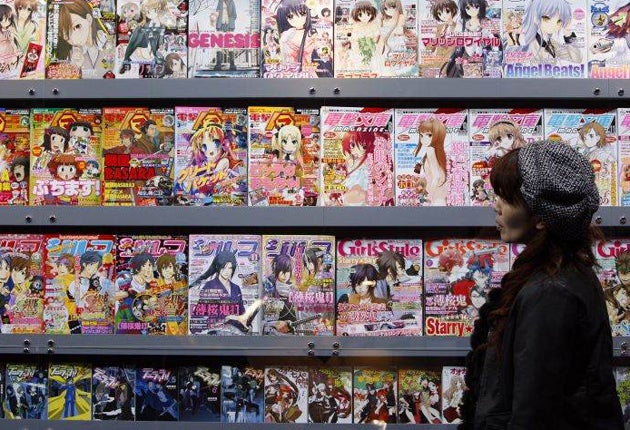Clampdown on 'extreme manga' as Japan's censors sharpen knives

Beautiful gay boys of indeterminate age having stylised sex may not be on every parent's list of suitable reading for their children. But Japan has long been tolerant of the freewheeling, sometimes eye-boggling content of its manga comics and animated movies.
Now conservative politicians are clamping down with a controversial censorship law that critics say will cripple one of the country's few growth industries. Tokyo's metropolitan assembly has banned the sale or rental of comics and anime (Japanese amination) movies depicting younger characters engaging in "extreme" sexual acts, including rape and child sex. The ban this week calls for the industry to "self-regulate" by restricting the sale of material that, among other things, "unduly lauds or exaggerates incest" among under-18s.
Government censors will stamp the word "unwholesome" on offending books and movies. The city's right-wing governor Shintaro Ishihara, who led the censorship drive, applauded the vote. "You cannot possibly show such things to your own children," he said. "This vote shows that Japan still has some common sense after all."
Japanese comics, which are read by adults and children, are part of mainstream culture and often explore complex subjects, including business, war and politics. A manga version of Marx's Das Kapital recently made it into print, joining Tolstoy's War and Peace, Hitler's Mein Kampf and Shakespeare's King Lear. But although the country's shelves groan with romance and literary manga, it is the genre's hardcore fringe that has long upset conservatives.
Fetishes, violent sex, incest and so-called Lolita-porn, or erotic drawings of female childlike characters are common themes. A genre called "boys' love" aimed at younger women depicts idealised homoerotic relationships between young men. Debate has raged for years on the impact of such material on children. Violent manga and anime have been cited in the trials of several notorious Japanese serial killers, but sexual and violent crimes are comparatively rare in Japan.
Exports of comics, animated movies and games have mushroomed in the last decade. Former Prime Minister Taro Aso was a famous manga -fan and the government has bundled popular culture into its "Cool Japan" strategy, which focuses on the commercial and soft-power potential of the industry abroad. Prime Minister Naoto Kan recognised the industry's importance this week when he blogged on the censorship dispute. "Upbringing of youth is an important matter. But it's also important to present Japan's anime to the world," he wrote.
Writers and publishers have reacted angrily to the Tokyo ban, which will impose fines of up to 300,000 yen (£2,280) on publishers and retailers.
A group of Japan's biggest publishers has threatened to boycott next year's International Anime Fair, which attracts about 100,000 visitors and is supported by the government.
Mr Ishihara is unmoved by the threat. "If they're outraged by this then they shouldn't come," he said, but Prime Minister Kan has pleaded with the publishers to change their minds.
Opponents have not been appeased by a clause in the legislation promising to take note of "artistic and social expression".
The Tokyo Bar Association criticised the wording of the legislation, which homes in on "exaggerated" content, warning that it could be the thin edge of the censorship wedge. "This law could be used to restrict freedom of speech," it said. Tokyo officials have already visited bookstores and branded about 4,000 publication "unwholesome" in readiness for next summer when the law takes effect. Manga and anime artists expect the government to expand the definition of adult-only and affect the entire industry.
Mainstream manga
One Piece
Selling 200m copies so far, the One Piece series tells the story of Monkey D Luffy, a boy with elastic limbs who roams the high seas with a crew of pirates.
Fullmetal Alchemist
This popular series follows two brother alchemists who lose their bodies when trying to revive their mother, and try endlessly to regain human form.
Manga on the fringe
Age Called Blue
Acclaimed by aficionadoes, this "Boys Love" title revolves around two male friends brought ever closer together by their love of music.
Kaze (No Stigma)
The first commercially available "Boys Love" title, published in 1976 to huge interest, wasn't released for nine years because of publishers' nerves. It tells the story of a promiscuous student abused by his uncle.
Join our commenting forum
Join thought-provoking conversations, follow other Independent readers and see their replies
Comments